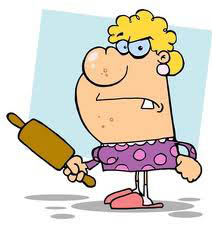Menopausal Problems and How to Deal With Them
Menopause is the period in a woman's life around which her menstruation cycle ceases, this occurs between ages of 45 and 55 normally. This is also the time when the woman's natural child bearing capacity ends. This transition is gradual and may trigger a lot of emotional and physical problems. Most of these problems do respond to very simple measures and by taking those measures on time, this transition can be made a very smooth one.
The time of menopause is determined by a lot of factors - hereditary, lifestyle conditions, medical conditions, eating habits etc.
What exactly is menopause?
 As age progresses, the supply of the hormone estrogen begins to lower, also the same case with progesterone, the second female sex hormone. This is because the ovaries stop producing these hormones gradually. This process of ceasing production of hormones is spread out over 5 to 10 years before it finally stops. This presents a lot of difficulties in the form of hot flashes, menstrual irregularities, irritability etc. You may experience constant mood swings and anger outbursts all the time earning labels as 'that grouchy woman'.
As age progresses, the supply of the hormone estrogen begins to lower, also the same case with progesterone, the second female sex hormone. This is because the ovaries stop producing these hormones gradually. This process of ceasing production of hormones is spread out over 5 to 10 years before it finally stops. This presents a lot of difficulties in the form of hot flashes, menstrual irregularities, irritability etc. You may experience constant mood swings and anger outbursts all the time earning labels as 'that grouchy woman'.
For most women, fertility is associated with her sense of worth in relation to others - especially her husband. An end to fertility means lowering of self esteem which gradually gives rise to a lot of emotional problems. These emotional problems may be further aggravated by physical problems that she is already facing. Menopause period is also around the time when there are major life changes taking place in a woman's life most significant of which is children leaving home, elderly parents or in-laws growing old and ill, possible death of of parents or spouse etc. In a sense, it can be a phase of multiple losses, especially if the family is small and the child leaves home for study, career, marriage etc. the loss is even more magnified in scale. At such a time when physical problems crop up, it becomes a very difficult time of your life.
Symptoms of Menopause
Most common signs of menopause, apart from stopping of periods, are hot flashes and heavy sweating during nights. These can continue for weeks, months and years too. This can become slightly embarassing or uncomfortable issue that may interfere with sleep.
Other symptoms are dryness in the vagina which may cause discomfort and may also lead to pain during intercourse.
Headaches, fatigue, insomnia and all of these leading to depression.
The skin may become thinner and drier giving rise to uncomfortable itching.
The bones gradually become less dense, causing osteoporosis in some women who are deficient in calcium. Such women are more prone to fractures.
Heart diseases and strokes may become more likely since the natural protection against them that is given by the female sex hormones ceases.
Prevention of Menopausal Symptoms
Healthy lifestyle and healthy eating habits will definitely address most of the problems associated with the menopause. All through your life, if you  have taken care of eating calcium, magnesium-rich foods that are bone-building nutrients, then you may have a lower risk of osteoporosis. If not, then now is the time to enrich your diet with these foods.
have taken care of eating calcium, magnesium-rich foods that are bone-building nutrients, then you may have a lower risk of osteoporosis. If not, then now is the time to enrich your diet with these foods.
Regular weight-bearing exercises such as walking also helps improve the density of your bones. Walking for at least an hour will give you these benefits, but it should be at a brisk and even pace.
Aerobic exercises also should be taken up to prevent any form of arterial diseases, including activities such as jogging or swimming at least three times a week.
Eating right - It is very important to make sure that you eat the right kind of foods that will help prevent heart attacks, strokes and other forms of arterial disease. Eating right will also prevent discomforting hot flushes and other menopausal symptoms.
Managing your stress better also becomes crucial at this point because too much stress also speeds up fall in the levels of estrogen. Stress management coupled with regular sexual activity also has the added benefit of reducing the risk of developing vaginal dryness.
Staying positive - Maintaining a positive outlook towards life will greatly help your symptoms. Therefore try to stay happy and stay connected with friends and relatives. Having close friends with whom you can share your problems and griefs works wonders in staying happy and feeling loved.
Treatment and Therapies
Diet - Eat plenty of foods that are rich in calcium, essential fatty acids, plant hormones, and Vitamins C and E. These foods are essential to maintain strong bones and proper balance of various blood fats. These foods also help relieve hot flashes to a great extent and also reduce night sweats and vaginal dryness. Eat foods that are made from whole grains so that essential fiber and vitamins is not lost in processing the foods.

Example of such foods: Foods containing plant hormones are soy products such as tofu, tempeh, yogurt, soyabeans etc. (exclude soy sauce as it is highly processed and contains too much sodium), celery, fennel, fruits, whole grains and flaxseeds. The high concentrations of plant hormones (phytoestrogens) found in the various soy products mimic the action of human estrogen and therefore help compensate the falling levels of estrogen. Most importantly, the plant hormones also help block the action of estrogen when fluctuating hormone levels create an imbalance in the ratio of estrogen to progesterone.
Essential fatty acids found in oily fish such as salmon, mackerel, tuna are also recommended. Other sources include nuts, seeds, whole grains and cold-pressed vegetable oils.
Increase intake of milk, yogurts, cheeses etc. for calcium supply.
Drink at least 7-8 glasses of water per day. If hot flushes are frequent and a major problem, then it is advisable to cut down the intake of caffeinated  drinks like tea, coffee, and avoid alcohol and spicy foods. A word of caution though, do not abruptly stop the caffeinated drinks as it might lead to headaches, but do so gradually by reducing the number of cups consumed per day and if at all possible, ading more amounts of decaffeinated coffee or tea to your regular brews.
drinks like tea, coffee, and avoid alcohol and spicy foods. A word of caution though, do not abruptly stop the caffeinated drinks as it might lead to headaches, but do so gradually by reducing the number of cups consumed per day and if at all possible, ading more amounts of decaffeinated coffee or tea to your regular brews.
Eat plenty of fruits and leafy green vegetables. This will add the much needed fiber content to your diet.
Exercise - As has been repeatedly said by many experts, exercise is the great reliever and healer of many symptoms. Exercising regularly relieves depression by raising the levels of endorphins, the feel-good hormones which help lift our mood. Exercise also reduces hot flashes and when combined with the right diet and nutrition regimen, will help maintain weight much easily and more important, help control weight permanently by increasing our body's metabolic rate. It has been proved that regular exercises also help maintain bone density and thereby prevents slow osteoporosis.
Yoga and Meditation - In addition to other exercises, practicing yoga will help you in more ways than one. By specific exercises for specific muscle groups and body parts, it will help maintain overall good health and various stretching exercises included in yoga will also help you remain supple and fit. It also helps in improving your mental health and when coupled with various meditation tehcniques, will help improve your outlook towards life and make you an optimistic person.
Nutritional Supplements - In addition to the right diet, taking extra supplements will also be helpful in reducing symptoms. The supplements that can be taken include:
- Vitamin A - To prevent Vaginal and urinary tract infections since women are more susceptible to such infections during menopause because of drying of mucous membranes.
- Vitamin C and Flavonoids - To reduce hot flashes
- Vitamin D - To maintain the strength and density of bones.
- Vitamin E - For hot flashes, vaginal dryness, dryness of skin etc.
- Vitamin B Complex and Magnesium - For symptoms of mild depression and anxiety. To help prevent bloating and fluid retention in the body.
- Fish oil - To aid in hormone production.
Herbal Remedies - There are many proven herbal remedies that help alleviate many menopausal symptoms. However, before taking up any of the herbal remedies, it is advisable to consult your own doctor first since some of the herbs may be contraindicated against one or more of the medicines that you may be taking.
Many herbs act as mild estrogens and help rebalance the hormone levels in your body. For all round benefits, sage tea is recommended with good results, as well flaxseed oil and evening primrose oils.
The herbs that work on specific symptoms are as follows:
- Peppermint known for its cooling properties is useful for treating hot flashes. Drink peppermint tea regularly. When working out or traveling, carry some peppermint oil with you and when you start feeling hot, just sprinkle a few drops on a tissue and inhale deeply at intervals.
- St. John's Wort for sleeping difficulties and depression associated with menopause.
- Kava for anxiety.
- For vaginal dryness, take dong quai, a well known Chinese herb which is also known as 'female ginseng.'
Aromatherapy - This therapy also works alleviate many menopausal symptoms. Some oils that help in regulating hormone prodcution are sandalwood, lavender, neroli, rose attar, geranium and neroli (bitter orange).
For preventing recurrence of hot flashes or any other symptoms, add three drops of clary sage or two drops each of rose attar and geranium oils to your daily bath. A few drops of lavender oil in a vaporiser will help you relax greatly.
Flower Essences - Some flower essences such as Larch for lack of self confidence, mustard for depression with no apparent causes are useful to alleviate symptoms. Mood swings due to raging hormones may be treated with Scleranthus while She oak is useful to harmonise emotions and feel generally good.
Homeopathy - Homeopathy is another great and effective way to treat symptoms of menopause.
Some common medicines are:
For hot flashes, anxiety, painful intercourse and decreased sex drive, take Sepia.
Lachesis for hot flashes, uterine cramps, heavy bleeding, night sweats and irritability.
Hot flashes, overwhelming emotions and mood swings can be alleviated by Pulsatilla.
Word of Advise
All the above remedies are given here only as a guide and not as a treatment all on its own. Before taking up any therapy or remedy, it is always advisable to consult a doctor. Also, while taking them, if any other new symptoms develop or the existing symptoms are aggravated, immediately stop the therapy or remedy and see a doctor immediately.
Some pointers to help you remain positive
Relax -Try to relax by taking regular holidays, picking up your hobbies that you could not pursue when young. Relaxing will help you get the much needed breathing space and help you see life in a better perspective.
Accept Change - Expecting others to change for you may not work, especially grown up children, spouse or partner, etc. It will drive them further away from you. Also accept that you cannot have everything that you may want and also learn to accept that what you want from others may differ from what they want. Usually at this age, most women develop more clinging attitudes towards their grown up children and is normally the reason for grief in many families. Recognizing and accepting that they are now independent individuals with needs and aspirations that do not match yours is the beginning of a good and healthy relationship.
 Self Management - Be assertive and confident. Listen carefully to your own needs and work on ways to achieve them. Most importantly, voice out your needs to your loved ones. They may not necessarily understand what is going on in your mind. By speaking out your problems and concerns, you will only help them understand you better and thus build a more better support system for yourself.
Self Management - Be assertive and confident. Listen carefully to your own needs and work on ways to achieve them. Most importantly, voice out your needs to your loved ones. They may not necessarily understand what is going on in your mind. By speaking out your problems and concerns, you will only help them understand you better and thus build a more better support system for yourself.
Stay Active - Try and stay active doing something besides your routine chores. eg. Pick up some volunteer work on your own working with some like-minded groups, like teaching poor children or neighborhood maids etc. take part in activities that interest you such as watching birds, gardening clubs etc. By remaining active and working with people who have common interests as you have will help you stay focused and positive.
Last but not the least, the menopausal phase should not be taken as the beginning of the end of your life, but as a new stage where you have ample scope of learning new things and a beginning of a new life altogether.
Like it on Facebook, Tweet it or share this article on other bookmarking websites.

